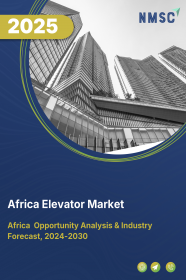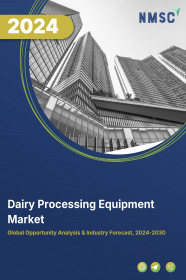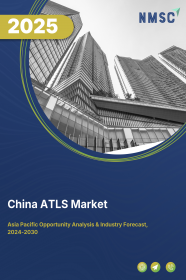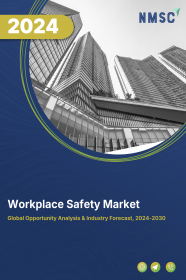
Africa Elevator Market by Type (Passenger elevator, Freight elevator and Others), by Technology (Traction and Hydraulic), by Service (New Installation, Maintenance and Modernization), by Capacity (Less than 1500 kg, 1500 to 2500 kg, 2501 to 4000 kg and More than 4000 kg) by Speed (Less than 1 M/S, Between 1 to 4 M/S and More than 5 M/S), by Deck type (Single Deck and Double Deck) and Others - Opportunity Analysis and Industry Forecast, 2024 –2030
Industry: Construction & Manufacturing | Publish Date: 15-Feb-2025 | No of Pages: 129 | No. of Tables: 95 | No. of Figures: 60 | Format: PDF | Report Code : CM1660
Market Definition
Africa Elevator Market size was valued at USD 1.04 billion in 2023, and is predicted to reach USD 2.20 billion by 2030, at a CAGR of 10.2 % from 2024 to 2030.
The elevator industry represents a dynamic sector encompassing the conception, production, installation, and maintenance of elevator systems. From conventional traction elevators to cutting-edge smart solutions, this market offers a diverse array of vertical transportation options tailored to suit the specific requirements of various buildings and infrastructure projects. Key stakeholders within the elevator market include manufacturers, suppliers, contractors, architects, building owners, and facility managers.
Manufacturers continually innovate to enhance elevator performance, safety standards, and sustainability practices, while suppliers provide essential components and materials necessary for system assembly. Furthermore, sustainability considerations such as energy efficiency and material recyclability are increasingly integrated into elevator design and operation, aligning with broader environmental objectives and sustainable building principles. As a result, the elevator market serves as a fundamental cornerstone of vertical mobility, enriching functionality, accessibility, and sustainability in buildings and urban landscapes worldwide.
Robust Urbanization Within the Region is Propelling the Growth of the Market
The elevator market in Africa is experiencing significant growth, due to the rapid urbanization and infrastructure development across the continent. As African countries invest in urban infrastructure and industrial projects, megacities like Lagos in Nigeria are on track to become some of the world's most populous.
The burgeoning urban population creates a heightened demand for vertical transportation solutions, driving the need for elevators in residential, commercial, and public buildings. This presents lucrative opportunities for market players in the region to capitalize on the growing demand for elevators as essential components of modern urban infrastructure.
Rising Infrastructure Development Drives the Growth of the Market
Infrastructure development initiatives represent another key driver for the Africa elevator market. Despite the lower market size influenced by the region's urbanization rates, ongoing infrastructure projects across various sectors offer opportunities for elevator installations.
As countries like Iran and Iraq continue to urbanize, with 77.3% and 71.6% of their populations residing in urban areas respectively, there is a growing demand for modernized infrastructure including elevators in residential, commercial, and public buildings. Investment in infrastructure projects can drive the growth of the elevator market in the Middle East, catering to the evolving needs of urban populations and enhancing the overall quality of life in these regions.
High Initial Cost Related to the Market Hinders the Growth of the Market
The significant costs related to elevator installation, maintenance, and upgrades present hurdles to market expansion. Building owners face substantial financial burdens, ranging from initial installation expenses to ongoing maintenance fees and the necessity for upgrades to meet safety standards and improve energy efficiency.
These challenges are especially daunting for owners in economically disadvantaged regions or older buildings. Consequently, the elevated costs associated with elevators hinder market growth across diverse geographical areas.
The Integration of Artificial Intelligence (AI) in elevators Paves the Way for Future Opportunities for Growth
The integration of AI-powered predictive maintenance into the elevator sector presents a promising opportunity, revolutionizing maintenance and operational practices through advancements in AI technology. By utilizing data captured from elevator sensors, AI algorithms can anticipate maintenance requirements in advance, minimizing downtime and maximizing elevator availability.
This proactive approach not only prolongs the lifespan of elevator components but also enhances safety by foreseeing potential malfunctions, optimizing resource allocation, and generating significant cost savings for elevator companies.
Moreover, well-maintained elevators contribute to increased user satisfaction, enhancing the overall experience for building occupants and visitors. Embracing AI-driven predictive maintenance enables elevator firms to stay competitive and uphold service excellence in an ever-evolving market landscape.
Competitive Landscape
The Africa elevator market comprises various market players, such as Schindlerm, Otis Elevator Company, KLEEMANN Ascenseurs, KONE Corporation, Pend Group, Hyundai elevator Co. Ltd, Mitsubishi Electric Corporation, Utility Elevators., Clovgate, Geco Lifts and others.
Africa Elevator Market Key Segments
By Type
-
Passenger elevator
-
Freight elevator
-
Others
By Technology
-
Traction
-
Machine Room [MR] Traction
-
Machine Roomless [MRL] Traction
-
-
Hydraulic
By Service
-
New Installation
-
Maintenance
-
Modernization
By Capacity
-
Less than 1500 kg
-
1500 to 2500 kg
-
2501 to 4000 kg
-
More than 4000 kg
By Speed
-
Less than 1 M/S
-
Between 1 to 4 M/S
-
More than 5 M/S
By Deck Type
-
Single Deck
-
Double Deck
By Designation Control
-
Smart
-
Conventional
By Door Type
-
Automatic
-
Manual
By Application
-
Residential
-
Commercial
-
Industrial
REPORT SCOPE AND SEGMENTATION:
|
Parameters |
Details |
|
Market Size in 2023 |
USD 1.04 Billion |
|
Revenue Forecast in 2030 |
USD 2.20 Billion |
|
Growth Rate |
CAGR of 10.2 % from 2024 to 2030 |
|
Analysis Period |
2023–2030 |
|
Base Year Considered |
2023 |
|
Forecast Period |
2024–2030 |
|
Market Size Estimation |
Billion (USD) |
|
Growth Factors |
|
|
Companies Profiled |
10 |
|
Market Share |
Available for 10 companies |
|
Customization Scope |
Free customization (equivalent up to 80 working hours of analysts) after purchase. Addition or alteration to country, regional, and segment scope. |
|
Pricing and Purchase Options |
Avail customized purchase options to meet your exact research needs. |
KEY PLAYERS
-
Schindler
-
Otis Elevator Company
-
KLEEMANN Ascenseurs
-
KONE Corporation
-
Pend Group
-
Hyundai elevator Co. Ltd
-
Mitsubishi Electric Corporation
-
Utility Elevators.
-
Clovgate
-
Geco Lifts

















 Speak to Our Analyst
Speak to Our Analyst




















